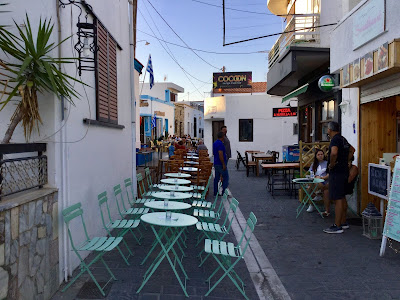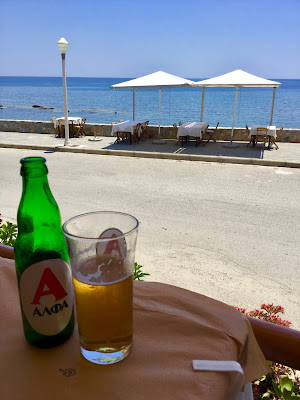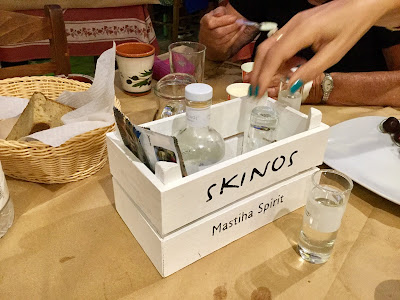I'm not sure how many people who don't actually live here in Greece are aware of this, but a practice that is quite commonplace here, at least on Rhodes, is for some families with an aged parent/grandparent who needs caring for to employ a live-in woman to do the job. For some reason that I'm not able to explain, it seems that the majority of these paid carers are Bulgarians.
We've had occasion to meet and befriend a few of these 'carers' over the past fourteen years, one of whom was the diminutive 'Dhopi', whom we quite often used to give lifts to, and who never failed to demonstrate her appreciation, even if the very least she did was to leave the equivalent of the bus fare in small change on our rear parcel shelf after she'd got out of the car when we were dropping her off somewhere. We gave up telling her it wasn't necessary. I wrote quite a bit about this plucky little woman and her very hard life in "A Plethora of Posts," in particular chapter 12, "A Little Bulgarian and Her Appreciativeness," and chapter 41, "Get Your Ya Yas Out." Dhopi would have us clutching our sides with laughter quite often, even though she was telling us things that demonstrated just how tough her existence was, while she was looking after an old lady (who was actually younger in years than she was!) who suffered from dementia.
Dhopi came back to mind just recently as we were talking with some Greek friends, from a village near here, about their difficult situation, which revolves around their oldest family member, now a widow in her mid nineties. There are several siblings, all middle aged or older, and a few grandchildren, ranging from their teens to their late thirties, who are tasked with looking after their mother's/grandmother's wellbeing.
The major burden falls to just one of the woman's children (and she has five) who lives right next door to her in the village. This daughter has herself two grown-up sons, and two brothers, both with families, still living in the same village. One or two other siblings have flown the 'nest' quite literally and live in other countries these days.
One of the old lady's sons is himself now in his mid seventies and has pretty major physical problems that make it difficult for him to walk. He and his wife have five children, all of whom, save for the oldest son, now live in other countries. The son, now just entering his forties, is still single and is tasked with helping his dad run their little business of renting sun-beds and a couple of modest little boats during the summer season.
In the UK there are all kinds of provisions from the state to help people with housebound relatives. My own mother' sister, in fact, back in the West Country of England, lived out her final years in what we in the UK call 'sheltered accommodation,' consisting of a comfy little flat, with a warden living on-site. Each resident has a panic button or specially adapted phone so that they can call for help in event of an emergency. My aunt's daughter would also look in on her mum several times a week, doing the best she could, while also managing her own family of herself, hubby and three children. My aunt even had her meals delivered to the house regularly by the UK "Meals on Wheels" service, manned by volunteers I believe, but I may be wrong.
Here in Greece there are no such provisions. It's expected that each family will care for their own, come what may. Unless the invalid is hospitalised, that is. But even then a member of the family will always be at the bedside, family members often running shifts to ensure that their love one always has someone next to the bed to help them to wash, or shuffle to the WC, for example.
Our local Greek friends, whose parent is in her nineties, well they all have to work. One or two of them are approaching 'pensionable' age, but, as is the case in the UK, the age at which they'd long anticipated retiring has in recent years been pushed back owing to austerity measures placing grave restraints on government spending. So, even though one of the siblings spends her entire life cooking, cleaning and caring for her mother, they've recently decided to take on a live-in paid carer, because the dear daughter who looks after her mother hasn't had a break for decades and the stage has now been reached where her mother needs constant vigilant care, including constant agonisingly slow trips to the bathroom all through the night.
At the time of writing, the family are on their third or fourth carer, all of whom have been Bulgarian. It's not that the carers haven't tried to do a good job, it's rather that the 'patient' simply refuses to have a stranger 'doing' for her, including helping her to the toilet. Thus, each time the sixty-something daughter has decided that she can maybe take a breather while the carer does the basics for her mother, the carer walks out owing to the recalcitrance of the patient making her job an impossibility.
We are aware of so many families, those who either don't want to or can't afford to employ someone, where one sibling is basically 'sacrificed' to the needs of the sole remaining widowed parent. It seems that it's expected that one of the siblings will forego any life of their own, often (though not always) entailing that they reman single too, in order to be sure that the parent is adequately cared for until they finally die.
There are nice aspects of this, in that it demonstrates a closeness in the family unit that's sadly long gone in much of the UK and other 'civilised' countries nowadays. On the other hand, though, it means that someone who may have wanted to marry, settle down, have a few kids, foregoes this life and becomes a full-time carer. Often the other siblings don't do much to help, since it's kind of, well, whoever draws the short straw is charged with all of the responsibility.
It's a cultural thing, harping back to patriarchal days, I suppose. Of course, respect for the elderly is still alive and well in Greek rural communities, which is one reason why this situation prevails, I suppose. Any one of us, considering how we shall possibly spend our dotage, would like to think that we were going to be well cared for, wouldn't we? Hopefully ungrudgingly too.
Just recently we heard news from our friend Dhopi, by the way. Some years ago now, she packed it all in and moved back to her home village in her native Bulgaria, where she was finally due to receive a modest state pension. She's now well into her seventies, but is still very agile and gets around a lot.
Oh, and she's caring for her mother, who's not far short of a hundred years of age.
We've had occasion to meet and befriend a few of these 'carers' over the past fourteen years, one of whom was the diminutive 'Dhopi', whom we quite often used to give lifts to, and who never failed to demonstrate her appreciation, even if the very least she did was to leave the equivalent of the bus fare in small change on our rear parcel shelf after she'd got out of the car when we were dropping her off somewhere. We gave up telling her it wasn't necessary. I wrote quite a bit about this plucky little woman and her very hard life in "A Plethora of Posts," in particular chapter 12, "A Little Bulgarian and Her Appreciativeness," and chapter 41, "Get Your Ya Yas Out." Dhopi would have us clutching our sides with laughter quite often, even though she was telling us things that demonstrated just how tough her existence was, while she was looking after an old lady (who was actually younger in years than she was!) who suffered from dementia.
Dhopi came back to mind just recently as we were talking with some Greek friends, from a village near here, about their difficult situation, which revolves around their oldest family member, now a widow in her mid nineties. There are several siblings, all middle aged or older, and a few grandchildren, ranging from their teens to their late thirties, who are tasked with looking after their mother's/grandmother's wellbeing.
The major burden falls to just one of the woman's children (and she has five) who lives right next door to her in the village. This daughter has herself two grown-up sons, and two brothers, both with families, still living in the same village. One or two other siblings have flown the 'nest' quite literally and live in other countries these days.
One of the old lady's sons is himself now in his mid seventies and has pretty major physical problems that make it difficult for him to walk. He and his wife have five children, all of whom, save for the oldest son, now live in other countries. The son, now just entering his forties, is still single and is tasked with helping his dad run their little business of renting sun-beds and a couple of modest little boats during the summer season.
In the UK there are all kinds of provisions from the state to help people with housebound relatives. My own mother' sister, in fact, back in the West Country of England, lived out her final years in what we in the UK call 'sheltered accommodation,' consisting of a comfy little flat, with a warden living on-site. Each resident has a panic button or specially adapted phone so that they can call for help in event of an emergency. My aunt's daughter would also look in on her mum several times a week, doing the best she could, while also managing her own family of herself, hubby and three children. My aunt even had her meals delivered to the house regularly by the UK "Meals on Wheels" service, manned by volunteers I believe, but I may be wrong.
Here in Greece there are no such provisions. It's expected that each family will care for their own, come what may. Unless the invalid is hospitalised, that is. But even then a member of the family will always be at the bedside, family members often running shifts to ensure that their love one always has someone next to the bed to help them to wash, or shuffle to the WC, for example.
Our local Greek friends, whose parent is in her nineties, well they all have to work. One or two of them are approaching 'pensionable' age, but, as is the case in the UK, the age at which they'd long anticipated retiring has in recent years been pushed back owing to austerity measures placing grave restraints on government spending. So, even though one of the siblings spends her entire life cooking, cleaning and caring for her mother, they've recently decided to take on a live-in paid carer, because the dear daughter who looks after her mother hasn't had a break for decades and the stage has now been reached where her mother needs constant vigilant care, including constant agonisingly slow trips to the bathroom all through the night.
At the time of writing, the family are on their third or fourth carer, all of whom have been Bulgarian. It's not that the carers haven't tried to do a good job, it's rather that the 'patient' simply refuses to have a stranger 'doing' for her, including helping her to the toilet. Thus, each time the sixty-something daughter has decided that she can maybe take a breather while the carer does the basics for her mother, the carer walks out owing to the recalcitrance of the patient making her job an impossibility.
We are aware of so many families, those who either don't want to or can't afford to employ someone, where one sibling is basically 'sacrificed' to the needs of the sole remaining widowed parent. It seems that it's expected that one of the siblings will forego any life of their own, often (though not always) entailing that they reman single too, in order to be sure that the parent is adequately cared for until they finally die.
There are nice aspects of this, in that it demonstrates a closeness in the family unit that's sadly long gone in much of the UK and other 'civilised' countries nowadays. On the other hand, though, it means that someone who may have wanted to marry, settle down, have a few kids, foregoes this life and becomes a full-time carer. Often the other siblings don't do much to help, since it's kind of, well, whoever draws the short straw is charged with all of the responsibility.
It's a cultural thing, harping back to patriarchal days, I suppose. Of course, respect for the elderly is still alive and well in Greek rural communities, which is one reason why this situation prevails, I suppose. Any one of us, considering how we shall possibly spend our dotage, would like to think that we were going to be well cared for, wouldn't we? Hopefully ungrudgingly too.
Just recently we heard news from our friend Dhopi, by the way. Some years ago now, she packed it all in and moved back to her home village in her native Bulgaria, where she was finally due to receive a modest state pension. She's now well into her seventies, but is still very agile and gets around a lot.
Oh, and she's caring for her mother, who's not far short of a hundred years of age.













